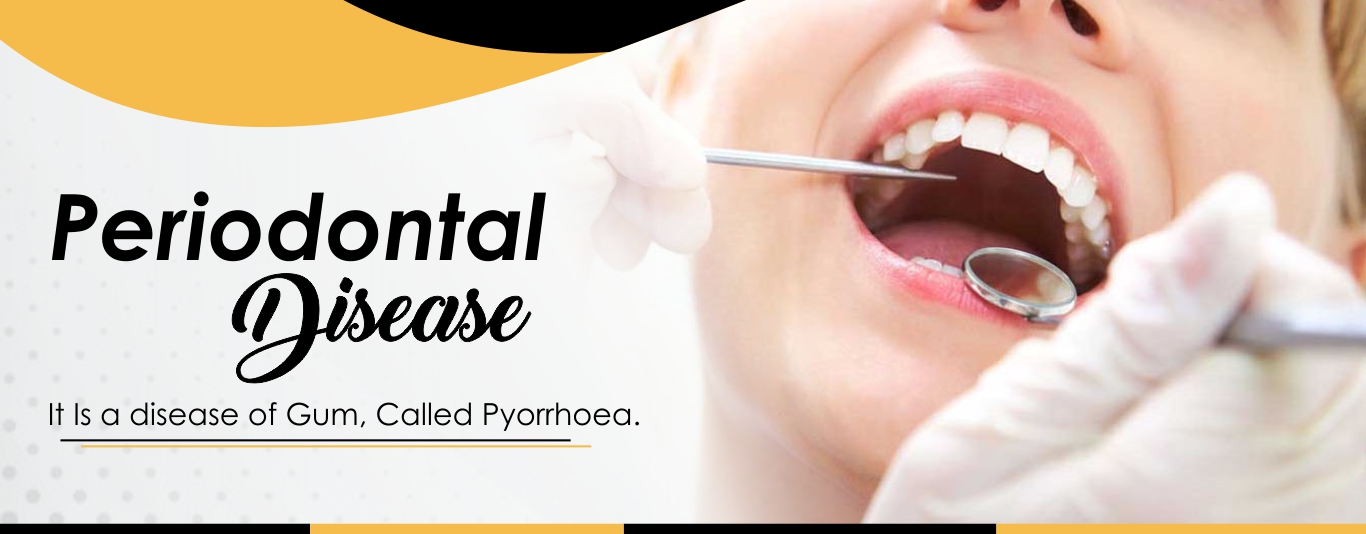
What Is Periodontal Disease OR Bleeding Gums:
If your hands bled when you wash them, you would be concerned. Yet, many people think it's normal if their gums bleed when they brush or floss.
Swollen and bleeding gums are early signs that your gums are infected with bacteria. If nothing is done, the infection can spread and destroy the structures that support your teeth in your jawbone. Eventually, your teeth can become so loose that they have to be extracted.
Periodontal diseases are infections of the structures around the teeth, which include the gums, periodontal ligament and alveolar bone. In the earliest stage of periodontal disease — gingivitis — the infection affects the gums. In more severe forms of the disease, all of the tissues are involved.
It is now well accepted that various types of bacteria in dental plaque are the major villains.
Researchers are studying possible connections between gum disease and:
- Atherosclerosis and heart disease — Gum disease may increase the risk of clogged arteries and heart disease, although the extent of this connection is unclear. Gum disease also is believed to worsen existing heart disease.
- Stroke — Gum disease may increase the risk of the type of stroke that is caused by blocked arteries.
- Diabetes — People with diabetes and periodontal disease may be more likely to have trouble controlling their blood sugar than diabetics with healthy gums.
- Respiratory disease — Gum disease may cause lung infections and worsen existing lung conditions when bacteria from the mouth reach the lungs.
Risks and Prevention
Although bacterial plaque buildup is the main cause of periodontal disease, several other factors, including other diseases, medications and oral habits, also can contribute. These are factors that can increase your risk of gum disease or make it worse once the infection has set in.
- Genetics — Researchers believe up to 30% of the population may have a genetic susceptibility to periodontal disease. Having a genetic susceptibility, however, doesn't mean gum disease is inevitable.
- Smoking and tobacco use — Smoking increases the risk of periodontal disease and the longer, and more one smokes, the higher the risk. If periodontal disease is present, smoking makes it more severe.
- Misaligned or crowded teeth, braces or bridgework — Anything that makes it more difficult to brush or floss your teeth is likely to enhance plaque and tartar formation above and below the gum line, which increases your chance of developing gum disease. And if overcrowded or crooked teeth are a problem, your dentist might recommend orthodontics to straighten out your smile and give you a better chance of preventing disease.
- Grinding, gritting or clenching of teeth — These habits won't cause periodontal disease, but they can lead to more severe disease if inflammation is already present. The excessive force exerted on the teeth by these habits appears to speed up the breakdown of the periodontal ligament and bone. In many cases, patients can learn to stop this habit simply by recognizing when it is happening and then relaxing. If these efforts don't work, your dentist or periodontist can create a custom guard appliance (sometimes called an occlusal guard, night guard, mouth guard or bite guard) that helps reduce the pressure of clenching or grinding on the teeth.
- Stress — Stress can worsen periodontal disease and make it harder to treat. Stress weakens your body's immune system, which makes it harder for your body to fight off infection, including periodontal disease.
- Fluctuating hormones — Whenever hormones fluctuate in the body, changes can occur in the mouth. Puberty and pregnancy can temporarily increase the risk and severity of gum disease, as can menopause.
- Medications — Several types of medications can cause dry mouth, or xerostomia, including antidepressants, diuretics and high blood-pressure medications. Without the protection of adequate amounts of saliva, plaque is more likely to form. Other medications may cause the gums to enlarge, which in turn makes them more likely to trap plaque. These medications include phenytoin (Dilantin and other brand names), used to control seizures; cyclosporine (Neoral, Sandimmune), used to suppress the immune system; and nifedipine (Adalat, Cardizem and others) and other calcium channel blockers, used to treat angina or heart arrhythmias.
- Diseases — Although the exact mechanisms aren't totally understood, certain diseases increase susceptibility to periodontal diseases. For example, people with diabetes are more likely to get periodontitis, than people without diabetes and it's likely to be more severe. Other diseases, such as leukemia, inflammatory bowel disease and HIV infection, also can increase the risk. Having one of these diseases will make control of periodontal disease more difficult, but a good periodontist or dentist who is aware of the additional risks and difficulties should be able to offer the kind of guidance needed to maintain your periodontal health.
- Poor nutrition — Nutrition is important for overall good health, including a working immune system and healthy gums and mouth.
How do I know I have gum disease?
- Bad breath that doesn't go away
- Red or Swollen gums
- Bleeding gums
- Loose teeth
- Sensitive teeth
- Longer appearing teeth
How is gum disease treated?
The types of treatment vary depending upon the severity of diseasel and includes cleaning of teeth and gums,flap surgery etc


